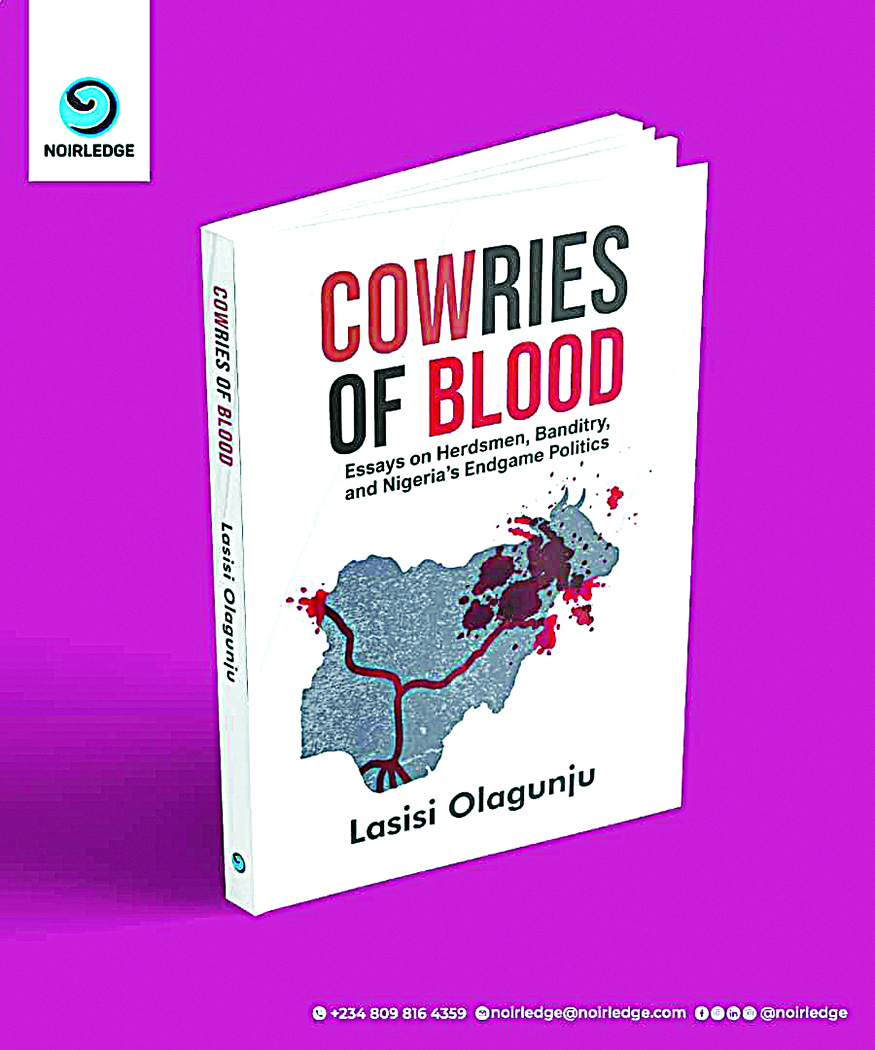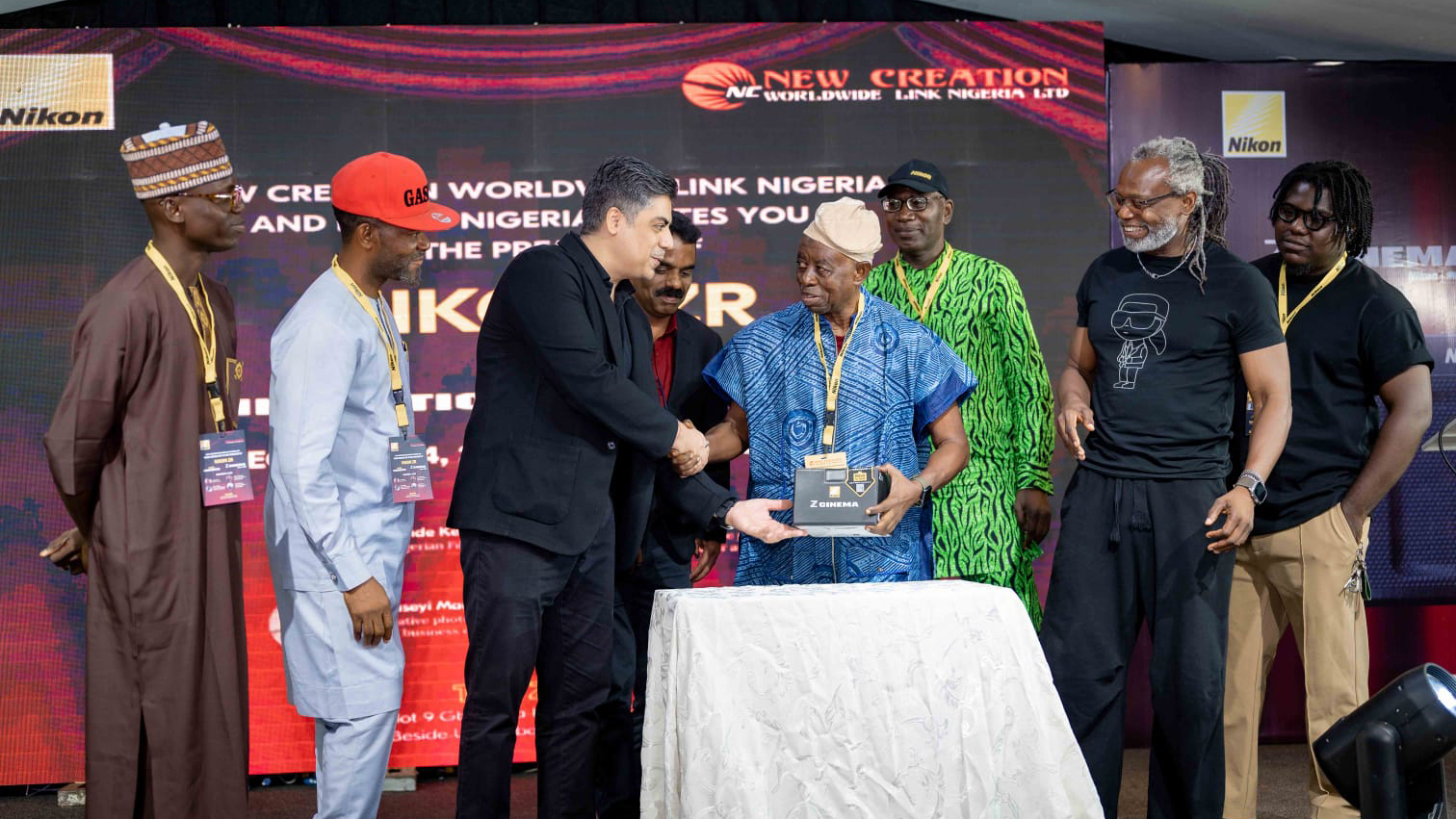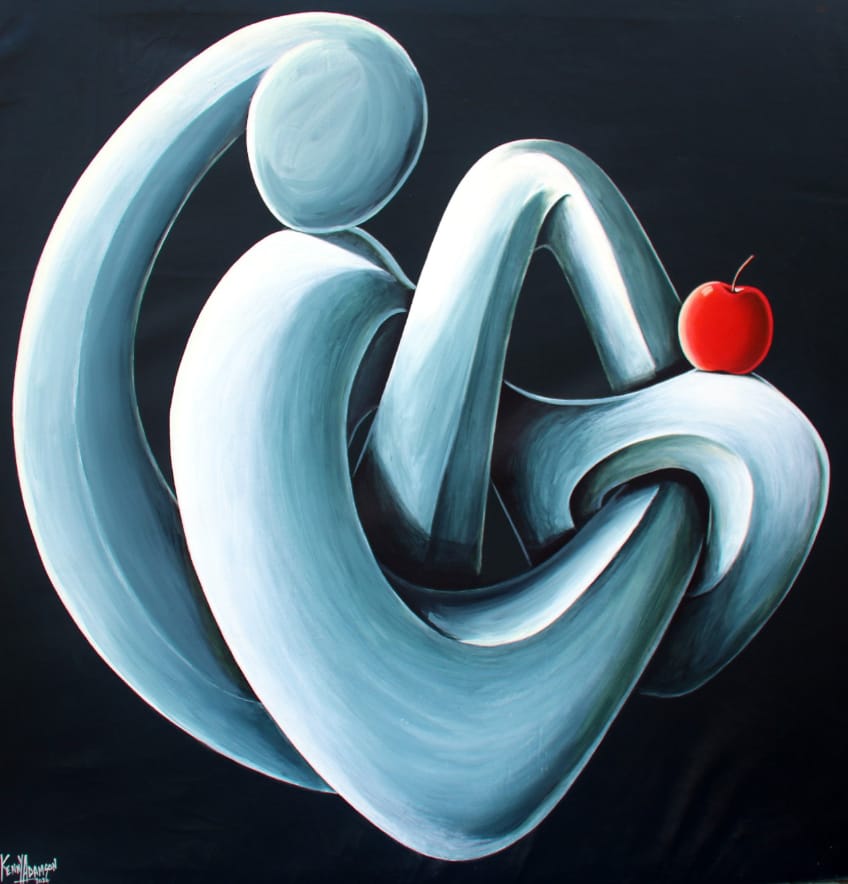Cowries of Blood is a collection of fiery essays on the unprecedentedly threatened security in our dear country, Nigeria. This is in terms of the lethal menaces of herdsmen, banditry and what the author calls Nigeria’s endgame politics.

Although most of the dilemmas, events and personalities the book spotlights are domiciled in the North, the book is the strident voice of a concerned Nigerian who deploys talent, skills, professionalism and gut to tell the country’s sore tales exactly as they are. His mission is to tell the North point-blank that, like a wayward favourite wife, it is the problem of itself and that of the national family.
Since the first impression endures well, I cannot wait till the end of this review before acknowledging the very beautiful quality of production of the 272-page publication, especially with the painstakingly cut pages that smell all that is lemon. It is in such a beautiful coat that Olagunju wraps the sordid tales he tells so that merely looking at the cover, one is confronted with a beauty and a beast, a potentially great country stranded in a festival of untamed cutlasses loose guns while bathing itself in its children’s blood.
Indeed, it is instructive to note that on the book cover is the map of our otherwise beautiful country dripping with blood at the top North. But because whatever falls from the head flows to the feet, the blood is seen coursing down South, flowing through the hapless channels of the rivers Niger and Benue, which ought to ordinarily be carriers of life and all that makes it pretty. This is how penetrating Olagunju’s perspective is right from the cover of Cowries of Blood to the extent that the saying that you do not judge a book by its cover does not apply here.
As the author notes in the preface, Cowries of Blood is a collection of articles selected from his ‘Monday Lines’ column in ‘Nigerian Tribune’, from among those published between 2012 and 2019. With the introduction written by Ambassador Dosunmu Awolowo and a foreword by another shrieking columnist who, unfortunately, recently passed on, Obadiah Mailafia, Cowries of Blood presents 53 articles arranged largely on the basis of thematic connection.
The opening story, Tears, Tears, Tears and Blood, is symbolically positioned, since many others are so soaked in blood, whether the physical or metaphoric one. It captures the double tragedy of a March 2012, Sunday bomb blast in a Jos Catholic Church.
Apart from the direct victims the blast produced, some civilians also paid a huge price as they were shot by soldiers who could not stand their protest (the people’s protest) against the incident. This article has a lethal link with some other ones, including Benue’s Murder in the Cathedral, where a priest and some church members were killed by terrorists.
The second article titled, Fulani Herdsman as a Metaphor, is also a story of tears, documenting the killing of a senator and rep member by those said to be Fulani herdsmen.
The writer elaborately bemoans a situation tenderers of animals have become wasters of men. But what appears to be most instructive is his assertion that the herdsman in the bush is not the real killer but the cow owners who send them out and equip them rather with frustration, hunger, man’s inhumanity to man and Ak 47s. Nigerian super-rich are the herdsmen, Olagunju writes in the article on page 21 of the work. Stories of killings, mostly erupting in or from the North, permeate the book, as will be found in Are we not at War?, detailing the Lafia strike where some 98 people were killed, with 55 being children; as well as in Uniformity of Chaos and Deaths (32).
Of course, the Lasisi Olagunju that many know is naturally almost a perfect gentleman. Friendly, humble, humane and very kind. As far as I know, many members of his media constituency who had cause to relate with him or the government he served in bear testimony to the fact that he made himself available to be a blessing to many as well as to the government he served. He refused to be intoxicated by power. Rather, he exploited it to bless mankind in his own humble way.
But if you are looking for the same gentleman in the author of Cowries of Blood, you will be terribly disappointed. For the Olagunju who naturally speaks as if he cannot finish eating a wrap of pap, as Yoruba idiomatically say, now assumes the status of the proverbial masquerader who no more fears the foe, the friend and even his in-laws once he is in the mask.
In some of the critical articles, he dissects the national dilemma created by regional suspicion, belligerence and manipulation, as we have in Back to Unongo’s Northern Nigeria, Amotekun and the North’s Fear, For Kudirat Abiola, The 123 Bikers from Jigawa (91), Ese Oruru: Northern Nigeria needs Help as well as The North 2019 Presidential Votes.
In some others, the writer also unleashes his fangs on some individuals whom, he believes, were or are acting silly. They Include ‘Sheikh Gumi and his Bandits’, ‘General Buratai and his Coup Talk’ (166) and ‘Agboola Gambari’s Burning Grass’ (129). Of course, President Muhammadu Buhari and his government are also accorded heavy knocks in certain areas, especially the ones connecting to the security of lives and property. Among such are ‘Buhari: Masquerade that won’t Dance’ (171), ‘Buhari’s Barren Fig Tree’ and ‘The President is Back’.
But it’s not in all the stories that the writer means. Even in his usual understandable irritation, he is able to identify noble policies, good programmes and impressive ideas. He, for instance, does this in the article, ‘El-Rufai and the Beggars of Kaduna’, where he applauds the governor for ordering them (the beggars) off the streets with some rehabilitation programmes.
In Cowries of Blood, Olagunju is not just an opinion writer. He is simultaneously a teacher, a historian and an analyst. As a result, it is difficult for anyone to fault him for his arguments because they are based on open and interrogated facts. Perhaps because he is convinced about such, he not only chronicles the ills, he also points the accusing finger and judges whoever is involved.
In spite of the gory nature of the stories told in the book, Olagunju’s literary acumen yet flowers through every nook and cranny of it. He blesses it with historical, philosophical, musical (King Sunny Ade and Orlando Owoh echo in the book) and cultural allusions in many areas. He is not shy to deploy Yoruba metaphors and proverbs, either as in the ori inu inner head parables or in occasional satire as we have in Chibok: Bring Back our Guts and The Honest Emir of Muri. For one, in a manner that does justice to the depth and first-class brilliance of the author, Cowries of Blood is a book of quotable quotes on Nigeria’s troubled peace.
I make bold to say that the haste to bare his mind hardly inflicted any communicational error on Cowries of Blood. The vocabulary bank is apt, the grammar is generally right. Well, there will normally be one or two little elements requiring enhancement in subsequent editions – like the use of ‘but’ with ‘although’ on page 19 and using ‘which’ in place of ‘whose’ on 21 – the fact is that inspiring language use is a theme on its own in Cowries of Blood. If there is any challenge I like to give Olagunju, it is just a challenge, which borders on the need to, in a sustained and pugilist way, take a look at how the fire of real pace-setting progress for which the South-West is famous also appears to be dancing ajoreyin. Perhaps Olagunju should visit some of the public schools with which Awolowo and his associates liberated us to see what they have now become.
Ironically, Cowries of Blood is simply as good and fundamental as that, as it provokes other vital questions to be asked. It is thus worth recommending on major grounds. First, it speaks to Nigeria in a compelling voice. It harbours the power of reawakening. Policymakers need it to chart a new course. Students, activities and individuals who need to encounter issues on the dilemma of leadership and nationhood will gain a lot from it. And for budding or aspiring columnists, Cowries of Blood is a printed school of opinion writing as the writer has established himself in the realm of the very best not only in Nigeria but also the world.






